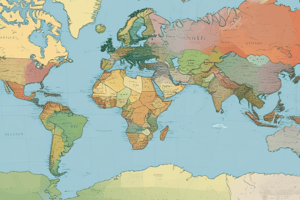Podcast
Questions and Answers
What is geopolitics?
What is geopolitics?
- The study of economics and sociology
- The study of how geography affects political power and international relations (correct)
- The study of climate and topography
- The study of the Earth's physical features
What does geopolitics help us understand?
What does geopolitics help us understand?
- How to develop agricultural land
- How to locate major cities
- How to establish trade routes
- How the natural environment shapes interactions among people and nations (correct)
Which field does geopolitics combine with to form a multidisciplinary study?
Which field does geopolitics combine with to form a multidisciplinary study?
- Geography and physics
- Geography and political science (correct)
- Geography and history
- Geography and literature
What is geographical determinism?
What is geographical determinism?
How does the availability of water resources influence geopolitics?
How does the availability of water resources influence geopolitics?
What is one of the main characteristics of geopolitics?
What is one of the main characteristics of geopolitics?
How does climate and topography impact the military strategies of nations?
How does climate and topography impact the military strategies of nations?
What is the concept of geographical proximity in geopolitics?
What is the concept of geographical proximity in geopolitics?
How does proximity between nations influence their relationships?
How does proximity between nations influence their relationships?
What role does geopolitics play in the study of international relations?
What role does geopolitics play in the study of international relations?
How can geography impact the political and economic relationships among nations?
How can geography impact the political and economic relationships among nations?
What motivates nations to seek control over strategic resources or territories?
What motivates nations to seek control over strategic resources or territories?
How does the location of a country in relation to other nations impact its foreign policy?
How does the location of a country in relation to other nations impact its foreign policy?
Why is studying geopolitics important for making informed decisions about international relations?
Why is studying geopolitics important for making informed decisions about international relations?
What does geopolitics aim to help us understand?
What does geopolitics aim to help us understand?
Why do countries located near potential adversaries often prioritize military spending and defense measures?
Why do countries located near potential adversaries often prioritize military spending and defense measures?
Flashcards
Geopolitics
Geopolitics
The study of how geography affects political power, international relations, and the balance of power among nations.
Geographical Determinism
Geographical Determinism
The idea that a region's physical features (climate, topography, resources) determine its political and economic outcomes.
Geographical Proximity
Geographical Proximity
The distance and physical barriers separating regions, influencing relationships among nations.
International Relations
International Relations
Signup and view all the flashcards
Natural Resources
Natural Resources
Signup and view all the flashcards
Trade Routes
Trade Routes
Signup and view all the flashcards
Military Strategies
Military Strategies
Signup and view all the flashcards
Political Power
Political Power
Signup and view all the flashcards
Balance of Power
Balance of Power
Signup and view all the flashcards
Topography
Topography
Signup and view all the flashcards
Climate
Climate
Signup and view all the flashcards
Strategic Resources
Strategic Resources
Signup and view all the flashcards
Foreign Policy
Foreign Policy
Signup and view all the flashcards
Motivations
Motivations
Signup and view all the flashcards
Territories
Territories
Signup and view all the flashcards
Major Cities
Major Cities
Signup and view all the flashcards
Study Notes
Geopolitics: The Intersection of Geography and Politics
Geography is the study of the Earth's physical features and the distribution of its inhabitants. While it may seem like a purely scientific discipline, it plays a crucial role in shaping our world and the way we live in it. One of the most significant ways geography influences our lives is through geopolitics, the intersection of geography and politics.
Geopolitics is a term used to describe the study of how geography affects political power, international relations, and the balance of power among nations. It is a multidisciplinary field that combines elements of geography, political science, economics, and sociology. Geopolitics helps us understand how the natural environment and human-made features of the Earth's surface shape the interactions among people and nations.
One of the most fundamental concepts in geopolitics is the idea of geographical determinism, which posits that the physical features of a region, such as climate, topography, and natural resources, play a significant role in determining the political and economic outcomes of a region. For example, the availability of water resources can dictate the location of major cities, the development of agricultural land, and the establishment of trade routes. Similarly, the climate and topography of a region can impact the military strategies of nations, with mountainous or desert regions posing unique challenges for armies to navigate and control.
Another important concept in geopolitics is the idea of geographical proximity, which refers to the distance and the physical barriers between regions. Proximity can influence the political and economic relationships between nations, with neighboring countries often having closer ties due to the ease of communication and transportation. Conversely, countries separated by large bodies of water or inhospitable terrain may have more limited interactions.
Geopolitics also plays a role in the study of international relations. By examining the geographical factors that shape the relationships between nations, geopolitics helps us understand the motivations behind the actions of governments and the dynamics of global power. For example, nations may seek to control strategic resources or territories to increase their influence and power in the world. Similarly, the location of a country in relation to other nations can impact its foreign policy, with countries located near potential adversaries often prioritizing military spending and defense measures.
In conclusion, geography plays a crucial role in shaping the political and economic relationships among nations, and understanding these relationships is essential for making informed decisions about international relations. By studying geopolitics, we can gain a deeper appreciation for the complex interplay between the physical environment and human societies, and use this knowledge to build a more peaceful and prosperous world.
Studying That Suits You
Use AI to generate personalized quizzes and flashcards to suit your learning preferences.
Description
Test your knowledge about how geography affects political power, international relations, and the balance of power among nations. Explore the multidisciplinary field that combines elements of geography, political science, economics, and sociology.




